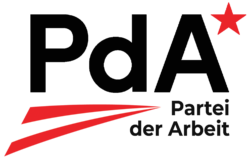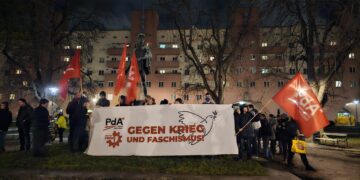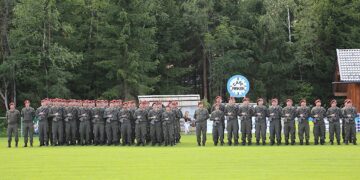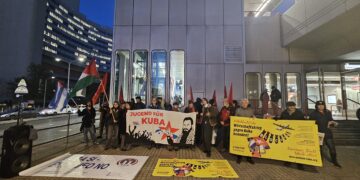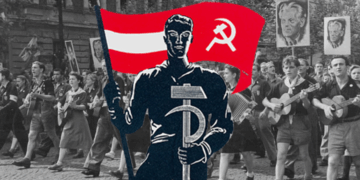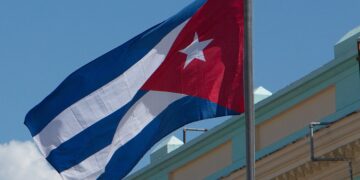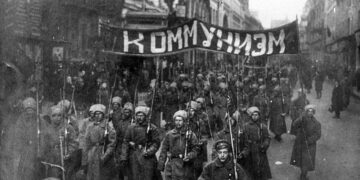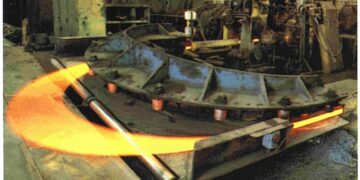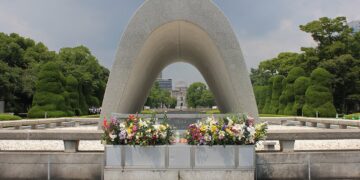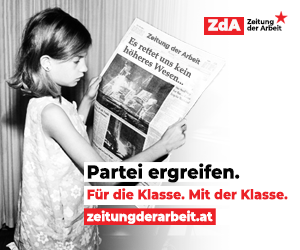As adopted by the 1st party congress, Vienna, 12 October 2013.
I. The Party of Labour
§1 The name of the party is the „Party of Labour of Austria“ [German: Partei der Arbeit Österreichs; abbreviation: PdA]. It is headquartered in Vienna. Its area of activity covers the entire federal territory of the Republic of Austria.
§2 The PdA is a revolutionary party of the Austrian working class and the other popular strata that are oppressed by capitalism and imperialism. Its views and aims are detailed in its declaration of principles and/or its party programme. It advocates and defends the interests of the working population in Austria. Its objective is to overthrow all relations in which people are oppressed and enslaved. The PdA strives for the overthrow of capitalism, for the construction of socialism and the realization of a classless society. The PdA takes a stand for peace, democracy, social and ecological progress and the right to national self-determination.
§3 The PdA is a party of proletarian internationalism. It views itself as a part of the international workers‘ movement and the worldwide collective of communist and workers‘ parties. However, it preserves its full autonomy, as at the same time it will not improperly interfere in affairs of other countries‘ parties.
II. Membership
§4 Membership of the PdA is open to all who – regardless of citizenship – have the centre of their life in Austria or are Austrian citizens abroad, are aged sixteen years and over, accept the programmatic principles and the constitution, pay membership dues regularly, and participate in the party’s work according to their possibilities and abilities. It is inadmissible to be a member of the PdA and of another Austrian party at the same time.
§5 Decisions concerning the approval of new members lie with the respective next higher leadership (district committee, provincial committee, central committee) in relation to the basic organisation that the new member is to belong to, or in relation to the geographic area where the new member has the centre of his/her life. The central committee, which must always be informed about new admissions and keeps the central membership register, may invoke a well-founded veto against the approval of a new member by a district or provincial leadership and refuse their admission. In this case the district or provincial committee concerned may appeal to the disputes committee.
§6 The membership ceases by resignation, expulsion, removal or death of the member.
§7 A member may be expelled as a result of grave or repeated offences against the programmatic principles or the rules of the constitution. Decisions concerning expulsions lie with the central committee. The member concerned may appeal to the disputes committee within four weeks and subsequently to the next party congress, with the member being entitled to a personal hearing in both instances. Decisions of the party congress are final. Until a definitive decision the membership remains suspended. If the member concerned does not appeal to the disputes committee or to the party congress then decisions of the central committee are final. A member may be removed from the membership list by decision of the central committee, if the person in question has not paid his/her membership dues for two years and does not respond to the party’s approach on this matter.
§8 The resignation from the party is permissible at any time and must be notified the responsible committee or the central committee in writing.
§9 Apart from regular members there may be associate members and honorary members. Honorary members are people who are appointed by the party congress and at the suggestion of the central committee because of special services to the party. Associate members are those who do not fully participate in the party’s work or do not meet all requirements of §4 in other respects, but support the party and its aims by special efforts. The approval of associate members lies with the central committee. Associate members have the right to participate in members‘ assemblies, conferences and party congresses as consultative delegates but without electoral or voting rights.
III. Structure
§10 The party’s structure is based on democratic centralism. All leaderships (district committees, provincial committees, central committee) are democratically elected from the bottom up, that is to say by the the highest authority of the respective sphere (district conference, provincial conference, party congress). These leaderships are accountable to their party organisations at the periodic conferences and at the party congress. Decisions of the leaderships and authorities are binding on all lower leaderships and authorities as they are for the respective party organisations and their members.
§11 The party’s institutions are the party congress as highest authority, the central committee, which has comprehensive decision-making authority between the party congresses, the control board and the disputes committee. All further, subordinate leaderships and authorities (provincial conferences and provincial committees, district conferences and district committees, membership assemblies and basic organisations) have competences only within their regional or local area or concerning their assignment at an establishment and are not permitted to interfere in matters of the party congress and the central committee as central institutions of the party.
§12 The party’s units are the basic organisations, district organisations and provincial organisations. Decisions concerning the constitution or dissolution of party units are made by the next higher leadership (district committee, provincial committee, central committee). The dissolution of party units may be enforced because of inactivity, insufficient members, offences against the party’s constitution or behaviour damaging to the party. An affected party unit may appeal to the disputes committee.
§13 The foundation of the party’s structure are the basic organisations. These are groups of at least three members on the basis of geographic area or a common place of employment, which means they are generally residential area organisations or workplace organisations. Three members willing to form a basic organisation can apply for the recognition of a new basic organisation by the next higher leadership, which also has to decide on possible dissolutions of existing basic organisations. The highest authority of the basic organisation is the periodical, at least monthly, membership meeting, which takes decisions by simple majority – it is a collective leadership. At least once a year a declared membership meeting must be held as a general meeting where the basic organisation elects one or two representatives. These undertake tasks of simple organisational administration and of communication with higher party units, leaderships or party institutions, in whose sessions they may be consulted if necessary. The representatives do not have political decision-making power on their own, which would deny the democratic rights of the membership meeting as collective leadership. The same holds for the power of representatives elected by the membership meeting to undertake special tasks such as finances and bookkeeping or the appropriate controlling. Basic organisations have the right to submit motions or raise requests to all higher leaderships or authorities.
§14 District organisations are constituted on the request of several basic organisations in the area of one or more Austrian administrative districts or prefectures. Decisions concerning the constitution or dissolution of district organisations lie with the next higher leadership. The highest authority of the district organisation is the at least annual district conference, which may be conducted as an aggregate meeting or as delegate conference drawn from the basic organisations. The district conference elects a district leadership, composed of at least a chair, a secretary, a treasurer and their respective deputies, who undertake the political leadership of the district organisation between the district conferences and are accountable at the next district conference. In order to monitor the financial conduct, an auditing board is elected composed of at least two members. The decision whether a district conference is conducted as an aggregate meeting or as delegate conference lies with the district leadership or, if this does not yet exist, with the next higher leadership. The same applies to the determination of the key for the number of delegates. District organisations have the right to submit motions or raise requests to all higher leaderships or authorities.
§15 Provincial organisations are constituted on the application of several district organisations in the area of an Austrian federal state. Decisions concerning the constitution or dissolution of provincial organisations lie with the central committee. The highest authority of the provincial organisation is the at least biennial provincial conference, which may be conducted as an aggregate meeting or as delegate conference drawn from the district organisations and/or basic organisations. The provincial conference elects a provincial leadership, composed of at least a chair, a secretary, a treasurer and their respective deputies, who undertake the political leadership of the provincial organisation between the provincial conferences and are accountable at the next provincial conference. In order to control the financial conduct an auditing board is elected, composed of at least two members. The decision whether a provincial conference is conducted as an aggregate meeting or as delegate conference lies with the provincial committee or, if it does not yet exist, with the central committee. The same applies to the determination of the key for the numbers of delegates. In federal states with an insufficient number of district organisations, but with several basic organisations which are geographically distant from each other, these basic organisations may require nevertheless the constitution of a provincial organisation. In this case the level of district organisations may be omitted partly or completely. Provincial organisations have the right to submit motions or raise requests to the central committee and the party congress.
§16 Correspondingly and limited to the respective geographical unit, the rules for the national level as laid down in §28 to §54 apply when calling and conducting district or provincial conferences as well as concerning the activity of district or provincial committees and district or provincial control boards.
IV. Rights and duties of full members
§17 All members have the right to contribute to the decision-making process of the party according to the party constitution. In particular they have full and equal voting and electoral rights within their party units.
§18 All members have the right to run for all party institutions, leaderships or functions within their party units.
§19 All members have the right to submit motions and questions to all party institutions, authorities and leaderships within their party units.
§20 If they have not been elected as delegates all members have the right to participate in a consultative capacity in delegate conferences within their party units as well as in delegate party congresses, as long as this does not exceed the party’s financial and technical capacities.
§21 All members have the right to appeal to the disputes committee in the case of disputes concerning the party.
§22 All members have the right to use the party’s infrastructure in the course of their party work. The respective leadership is responsible for direct permission and coordination.
§23 All members have the right to voice their opinions in the form of contributions to the party’s media. Decisions concerning the publishing lie with the respective editorial office appointed by the leadership, the leadership itself or – in case of a basic organisation – the membership meeting, each on the basis of predefined regulations.
§24 All members are obliged to follow and to contribute to the implementation of decisions and directives of the leadership of their own party unit as well as of all superior committees and authorities. The right to maintain a different personal opinion and to argue for it within the party remains untouched by this rule, as far as it does not contradict the party’s programmatic principles or its constitution.
§25 All members are obliged to abstain from doing anything that would damage the reputation or aims of the party, the implementation of decisions, its unity or its capacity to act.
§26 All members are obliged to participate in the party’s work according to their possibilities, the programmatic principles, the adopted decisions and the party’s constitution and to be organised in a basic organisation.
§27 All members are obliged to pay the membership dues regularly at the level determined by the party congress.
V. Party congress
§28 The party congress is the highest authority of the party. A regular party congress must be held every two years and is called by the central committee as a membership aggregate meeting or delegate congress, to be announced no later than six weeks in advance, stating venue, date and agenda. All members must be informed about the convocation in appropriate form. The determination of the key for the numbers of delegates lies with the central committee on basis of the central membership list. For a delegate congress there is no automatic delegate right for members from the central committee, who must also be elected as delegates from a basic, district or provincial organisation.
§29 An extraordinary party congress is to be called by the central committee or a regular party congress if important individual issues that affect the competences of the party congress have to be resolved during the term of office between two party congresses. An extraordinary party congress must also be called by the central committee if an appeal for one is supported by a quarter of the party membership. In addition, an extraordinary party congress must be called on request of the control board if it discovers grave mistakes or irregularities concerning financial management and a clarification is necessary before the next regular party congress. An extraordinary party congress must be announced no later than six weeks in advance.
§30 The party congress has decision-making power in all issues concerning the party. It takes decisions by a simple majority; a tied vote means the motion falls. An amendment to the party constitution requires a two thirds majority of the members or delegates present; a decision on the dissolution of the party requires a majority of three quarters.
§31 The party congress is quorate if 50% of the delegates are present or, in the case of a party congress in the form of an aggregate membership meeting, from half an hour after the announced starting time.
§32 At the beginning the party congress itself decides the agenda and the standing orders, elects a direction board of the party congress as well as the necessary commissions, each on proposal of the central committee.
§33 All party units in the form of their leaderships (including the central committee) as well as all members have the right to submit motions to the party congress. These must be submitted in writing to the central committee no later than two weeks before the congress. The central committee must inform the members about all motions no later than one week before the congress. Every motion submitted by the deadline must be dealt with by the congress. Decisions concerning the admission of late motions lie with the party congress itself.
§34 At the party congress every member of the congress may propose amendments to the motions orally or in writing during the hearing of the respective topic on the agenda.
§35 The members of the party congress have the right to speak without hindrance and to make their case on any topic on the agenda.
§36 The central committee must present the party congress with a political report, a review of its activities, and a financial report concerning its term of office since the previous party congress.
§37 The control board must report to the congress on its view and auditing concerning the financial management, whereupon the party congress has to take a decision on the approval of the actions of the central committee.
§38 The party congress elects the central committee, the control board and its alternate members as well as the disputes committee and its alternate members by secret ballot. The central committee officiating until the elections must present a recommended list. This recommended list may also include functions within the central committee in the form of direct ballot.
§39 All members have the right to stand for the central committee, the controlling board or the disputes committee. A candidacy may also be announced directly at the party congress itself.
§40 All candidates receiving more than 50% of the valid votes are elected.
VI. Central committee
§41 The central committee undertakes the general leadership and guidance of the party and its work. It is the highest authority after and between party congresses. It ensures the implementation of decisions of the party congress and takes necessary decisions until the next party congress. The activity of the central committee is substantially oriented according to the programmatic principles and the party’s constitution, the application and observation of which is the central committee’s responsibility.
§42 The central committee is composed of at least six members: the party chair, the party secretary, the party treasurer and their respective deputies. The number of additional members of the central committee is not limited. All functions must be exercised in person and principally on an unsalaried basis. Decisions concerning a possible employment contract lie with the central committee according to necessity, usefulness and financial capability. The party membership must be informed about employment contracts in appropriate form. If functions within the central committee were elected by direct ballot, these functionaries nevertheless remain responsible towards the central committee as the highest authority and collective leadership during the term of office. In case of grave reasons, functionaries may be voted out of office by a majority of the central committee and replaced by another member of the central committee. Membership of the central committee itself is not affected by such a recall and remains valid until the next party congress.
§43 The external representation of the party is the responsibility of the chairman and his/her deputy or deputies. If these are unable to carry this out the central committee may decide temporarily to entrust this task to any other member of the central committee.
§44 The secretary and his/her deputy or deputies undertake organisational and administrative tasks within the party as well as externally on behalf of the party. They support the chairman in leading ongoing operations and activities of the party. The treasurer and his/her deputy undertake the financial management and the bookkeeping of the party. Expenditures must be approved by the central committee.
§45 The sessions of the central committee are convoked and led by the chair or his/her deputy. The central committee is quorate when all members have been invited and at least 50% of them are present. The central committee takes decisions by simple majority; if there is a tie the chair has a casting vote. If important issues need an urgent clarification between the sessions of the central committee, it is permissible to make decisions with aid of technical or electronic means of communication. In doing so all members of the central committee must be involved in appropriate form. Decisions are taken by simple majority; if there is a tie the chair has a casting vote.
§46 In order to improve the administrative conduct of the party and its work, the central committee may appoint an executive committee or a secretariat from its own ranks. The ultimate decision-making power between the party congresses nevertheless remains at the central committee. Therefore the executive committee or the secretariat shall avoid making pre-emptive decisions on serious issues outside the central committee.
§47 The central committee may establish working groups or commissions in order to delegate specific tasks selectively or permanently to them. The members of working groups or commissions do not need to be members of the central committee. The ultimate decision-making power between the party congresses nevertheless remains with the central committee.
§48 The central committee is obliged to inform the party members regularly and in appropriate form about relevant issues of its proceedings as well as important decisions. Likewise the party members must be informed in advance about the dates of the central committee meetings.
§49 Motions and requests from party units or members to the central committee must be dealt with as soon as possible, and in any case no later than during the next session but one. Party units or members concerned must be informed about the results.
§50 If a member of the central committee is not able to fulfil his/her tasks any more or resigns from office, the central committee may co-opt a new full member as a substitute and, if necessary, decide on the redistribution of a function within the central committee. Co-options must not exceed a quarter of the number of members of the central committee elected by the previous party congress. If the central committee’s capacity to act is called into question by this limit, a party congress must be called.
§51 If the central committee completely loses its capacity to act or resigns, the control board is to call a party congress within four weeks, and is accorded all powers necessary to do so. If the control board has also completely lost its capacity to act or has resigned, the disputes committee is to call a party congress within four weeks, and is accorded all powers power necessary to do so. If the disputes committee has also completely lost its capacity to act or has resigned, the next lower leaderships are to come to an agreement to call a party congress within four weeks. If all lower leaderships have also lost their capacity to act, have resigned or do not exist, the representatives of the basic organisations are to come to an agreement to call a party congress within four weeks.
VII. Control board
§52 The control board and its alternate members, each consisting of at least three members who must not at the same time belong to the central committee or disputes committee, are elected at the party congress.
§53 The control board validates the financial affairs of the central committee, reports on this to the party congress and applies for a decision on the approval of the actions of the central committee. It is also authorised to audit all subordinate party units.
§54 If a member of the control board is not able to fulfil his/her tasks any more or resigns, an alternate member moves up for the remaining term of office and in the succession order determined by the party congress. If the control board completely loses its capacity to act, the disputes committee appoints two auditors, who act until the next party congress.
VIII. Disputes committee
§55 The disputes committee and its alternate members, each composed of at least three members who must not at the same time belong to the central committee or control board, are elected at the party congress.
§56 The disputes committee decides on disputes between party members, units and leaderships that have been brought before it and cannot be resolved by themselves. All party members, units and leaderships have the right to appeal to the disputes committee.
§57 The disputes committee makes decisions by simple majority after hearing of both disputing parties. Appeals against a decision and reference to the next party congress are permitted, with its decision being final within the party.
§58 The disputes committee will never take action on its own accord. It is not a political or ideological committee, but only makes decisions concerning the constitutional rightfulness of disputed decisions, measures or incidents within the party.
§59 If a member of the disputes committee is not able to fulfil his/her tasks any more or resigns, an alternate member moves up for the remaining term of office and in the succession order determined by the party congress. If a member of the disputes committee is personally involved in a disputed case and therefore compromised, an alternate member temporarily assumes their function during the proceedings of this case.
IX. Financing
§60 The party finances its activities by membership dues, admission fees, voluntary contributions, event revenue, donations, funds-raising, legacies and public funding.
X. Dissolution of the party
§61 The dissolution of the party can be decided only by the party congress and with a majority of at least three quarters of the votes.
§62 On the orders of the final party congress the party assets may be transferred to other parties or organisations with similar or allied aims. If this is not possible, any remaining party assets are to be used for socially beneficial purposes.
